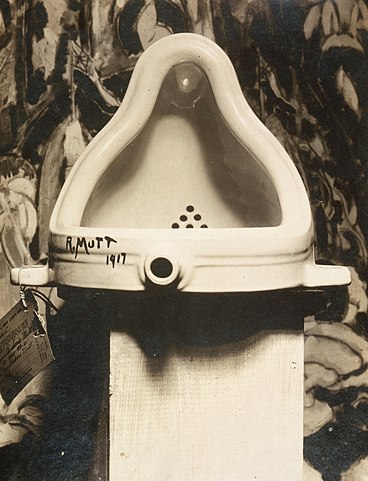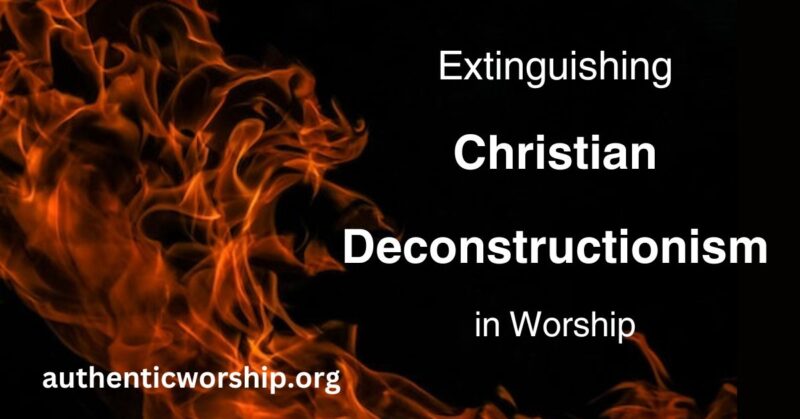Extinguishing Christian Deconstructionism in Worship
Cultural deconstructionism is probably the most prevalent secular philosophy to go unnoticed and unchallenged in the American church today. The question is not are you a deconstructionist, but how much of a deconstructionist are you?
King Josiah is my favorite Bible hero. He grew up in an idolatrous Israelite culture, not fully understanding the sinful thought patterns that surrounded him. But when those sinful philosophies were exposed before his eyes, scripture says he turned to the Lord with all of his heart, like no one before him or since.
Every era of history has prevailing philosophical assumptions. When those unbiblical assumptions go unchallenged, underlying philosophies take root in the mind and make the believer a prisoner to his own assumptions. Cultural deconstructionism is probably the most prevalent secular philosophy that goes largely unnoticed and unchallenged in the American church today.
The word deconstruction is commonly used in pop culture to denote the systematic dismantling of a person’s faith. It’s an important subject that others have addressed well. But while it’s a connected concept, philosophical deconstructionism is more widespread, and far more potent an enemy. Where faith deconstruction describes the loss of faith in an individual, philosophical deconstructionism is the secular attempt to remove all Christian influence from society. And secularizing forces have been very effective toward their goal. So much so, that many (most?) young Christians have unknowingly bought in.
History of Philosophical Deconstruction
Prior to the first world war, the Western world assumed an unrealistic optimism about human progress. The age of science and reason had led most everyone to assume that humanity was well on its way to a peaceful and prosperous utopia. This unchallenged assumption even led many Christians to the belief that their evangelistic efforts could single handedly usher in God’s kingdom. (The current idea that the world is getting worse and worse would sound silly to many 19th century Baptists, Methodists, and Presbyterians.)
But that cultural optimism was shattered, along with millions of lives by WWI. Mass cultural disillusionment set in as we came to understand that humanity does not exist on an ever-ascending plane of progress. Though some remained resilient and hopeful that WWI was “the war to end all wars,” (notice how none of us today would ever assume such a thing is possible) any remaining afterglow of the enlightenment was extinguished with the rise of Adolf Hitler and the second world war of 1939-1945. With over 115 million lying dead, the hope that humanity could overcome evil by sheer willpower gave way to our current society of cynicism, as well as a popular mistrust of “the establishment.”
Have you ever heard the phrase “down with the establishment?” In the wake of two world wars, the prevailing popular thought was that establishment institutions could not be trusted. Institutions had failed to prevent the carnage. In fact, institutions were largely complicit in evils such as the Holocaust. Governments, monarchies, and yes, religious institutions including Christianity took a major hit in cultural credibility as they were now deemed to be part of the problem. Americans in particular, became deeply anti-institutional, and that included the Church and “organized religion.”
Americans in particular, became deeply anti-institutional, and that included the Church and “organized religion.”
From 1918 onward, and especially after 1945, Western culture developed an attitude of deconstruction that permeated all of culture and society. Avant Gard art arose out of discontentment and distrust of established norms. The arts were used as an attempt to challenge and destroy old ways of viewing reality. True art, it was thought, was transgressive.
French American painter and sculptor Marcel Duchamp was at the forefront of the deconstructionist movement with the exhibition of his sculpture “Fountain”. In reality, the piece was merely a men’s urinal turned over on its side with the name “Mutt” inscribed.

When the piece was removed from the exhibition hall and stored behind a curtain, Duchamp resigned his position on the artistic committee, and he alleged artistic suppression.
In an editorial written in defense of “Fountain”, one writer single handedly laid the foundation for the postmodern movement when he wrote, “Whether Mr. Mutt with his own hands made the fountain or not has no importance. He CHOSE [sic] it. He took an ordinary article of life, placed it so that its useful significance disappeared under the new title and point of view – created a new thought for that object.”
It is clear that the goal of such art is not to build up and create, as it is to tear down; to deconstruct the establishment.
Transgressive worship is also inherently ego-centric. Read more here: Stop Making Worship About Self Expression
Over time, postmodern deconstruction has made its way into popular painting, architecture, and music. But it has not stopped in the arts. Deconstructionism has for many decades been viewed as a primary philosophy with which to understand the world. The pursuit of deconstruction is often celebrated as virtuous in and of itself. The philosophy is championed as freedom from oppression. It was the driving motivation behind the sexual revolution and is still at play in the move to break down the nuclear family. The fact that deconstructionism has transformed ethical norms on a societal level is a testament to the degree of vast transformation our society has experienced. Cultural and philosophical deconstructionism has been wildly successful.
The church is not immune to this secular transformation. In fact, mainstream American Christianity has accepted the philosophy largely unchallenged. Deconstructionist tendencies play a major role in mainstream Contemporary Christian Music. (Obviously, this is a generalization that does not include all CCM artists) If you analyze the lyrics of the most popular Christian radio hits, you can easily see deconstructionist themes such as challenging the establishment. Even melody lines in worship songs are written with the deconstruction of established musical norms in the breaking of conventional musical patterns in mind.
As Christians have always lived in, around, and among non-Christian cultures, it is naive to believe that Christian worship is never influenced by prevalent worldly philosophies. Church history demonstrates this weakness over and over. Twenty-first century American Christianity is largely characterized by an anti-traditionalist and anti-institutional sentiment that our brothers and sisters in church history would find baffling.
How can you identify deconstructionism in the Church?
While observing tradition for the sake of tradition is not biblical or beneficial, cultural deconstructionists do the opposite by seeking to deconstruct for deconstruction’s sake.
For example,
- Deconstructionists dislike traditional church buildings simply because they are associated with the “old way of doing things.”
- Deconstructionists want to replace ancient hymns of the faith, believing the Church to be “beyond that now.”
- Because deconstructionism is so anti-establishment, deconstructionists tend to have a low view of Christian denominations. They tend to say things like “I’m not really a Baptist, I just attend a Baptist church.” This common view today would have been impossible prior to the World Wars and deconstructionist thought.
- Deconstructionists often try to “purify” their local church from all evidence of an ostensibly hypocritical establishment that they deem “inauthentic.” These efforts are often directed at eliminating any music, architecture, and decor that is deemed too “traditional.” I once knew a young lady who said she would cut the steeple off the church herself if she could reach it. All because she hated the traditional message she believed it symbolized.
- Popular level deconstructionism is the driving force behind name changes in many local churches and denominations. For example, a change from Grace Baptist Church to just Grace Church downplays a connection to an institution without actually changing the underlying church or organization. (While there is perhaps some merit in choosing church names that resonate with the lost, I am baffled by church associations who also choose to deconstruct their own names as well. While churches are public facing toward the community, church associations serve their cooperating churches, not the lost directly. So the only reason to deconstruct a church association’s name from say, Grace Baptist Association, to Grace Association, is to satisfy the deconstructionist desires of its members.)
It’s worth noting that change isn’t always the result of deconstructionism. Contemporary methods can be a wonderful and effective tool in helping the church worship. Modern church architecture can give a church a needed facelift. There are many good reasons to embrace Holy Spirit led change. The key to understanding deconstructionism is not in change itself, but change brought about through the ungodly, desire to “stick it to the man,” or defeat the “old guard,” or even to keep up with cultural vogue. Such philosophies have no place in the hearts and minds of Christians.
The key hallmark with Christian deconstructionism is the anti-establishment desire to “stick it to the man.”
What if you’re a deconstructionist?
It’s not uncommon to find that you yourself have adopted secular philosophies. Like King Josiah in 2 Kings 22 and 2 Chronicles 34, we are all steeped in unbiblical cultural ideologies since birth. In fact, it would be surprising if you could read through the list above without seeing yourself represented. You may even be inclined to defend a point or two! (I certainly hope not.) The question is not if you are a deconstructionist, but how much of a deconstructionist are you? And like King Josiah, we all have the responsibility to change our mind and walk a different path.
The question is not are you a deconstructionist, but how much of a deconstructionist are you?
As Christians, we should not remain ignorant of our own presuppositions. We are commanded to “take every thought captive to make it obedient to Christ.” Therefore, every Christ follower would do well to reflect on what cultural assumptions they harbor, and how those assumptions impact how they worship. Aim to be a Josiah.
To learn more about the worship please subscribe!

